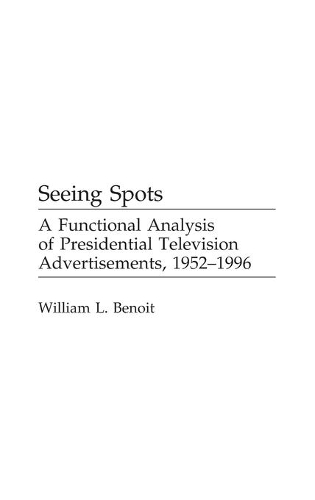
Seeing Spots: A Functional Analysis of Presidential Television Advertisements, 1952-1996
(Hardback)
Publishing Details
Seeing Spots: A Functional Analysis of Presidential Television Advertisements, 1952-1996
By (Author) William L. Benoit
Bloomsbury Publishing PLC
Praeger Publishers Inc
30th July 1999
United States
Classifications
Tertiary Education
Non Fiction
Political campaigning and advertising
Political structure and processes
324.730973
Physical Properties
Hardback
256
Description
Benoit provides a comprehensive analysis of presidential television spots from every campaign that used this important message form, from the 1952 campaign through the last national campaign in 1996. More than 1,600 presidential spots are analyzed, from both primary and general campaigns. Republican, Democratic, and third party candidate advertisements are analyzed. He uses the Functional Theory of Political Campaign Discourse, analyzing themes in spots as acclaims (self-praise), attacks (criticism), and defenses (responses to attacks). Themes are classified according to topic. Each of these topics is broken down further (policy: past deeds, future plans, general goals; character: personal qualities, leadership ability, ideals). Contrasts are made between spots from Republicans and Democrats as well as third parties, incumbents and challengers, and winners and losers. The spots from candidates who led, trailed, or were in close races also are contrasted. Spots are becoming more negative over time, Benoit concludes, in both primary and general campaigns. General campaigns are more negative than primary campaigns, Democrats are more negative than Republicans, and challengers are more negative than incumbents. There are no differences between winners and losers. However, candidates who trailed throughout the campaign were most negative, while candidates in close races were most positive. An important analysis for scholars and researchers in political communication and American presidential politics.
Reviews
It clearly makes a contribution to the study of advertising both in terms of method of analysis and the temporal analysis of advertising forms.-Recensions
Just about everything that can be learned (from a study that examines every presidential campaign that employed television spots during the primary and general election) will be found in this comprehensive analysis.-Choice
William L. Benoit's Seeing Spots is not to be missed by political analysts of presidential rhetoric and interested viewers of campaign commercials on television....useful and interesting to the lay reader, and should prove even more so for readers who are already familiar with the candidates' histories, or for readers who have seen the spots previously....Beniot's book fulfill its promise of conducting a cut-and-dried functional analysis for each major general campaign, as well as each primary, from the advent of TV spots in 1952 until 1996....He gives readers a richer, more contextualized sense of the most likely rationales for why candidates ran the spots they did, possible reasons for what did or did not work, and suggestions for ad strategies of future candidates. This book is recommended for teachers and students of contemporary political rhetoric, as well as creators and critics to televised campaign media.-Rhetoric & Public Affairs
"It clearly makes a contribution to the study of advertising both in terms of method of analysis and the temporal analysis of advertising forms."-Recensions
"Just about everything that can be learned (from a study that examines every presidential campaign that employed television spots during the primary and general election) will be found in this comprehensive analysis."-Choice
"William L. Benoit's Seeing Spots is not to be missed by political analysts of presidential rhetoric and interested viewers of campaign commercials on television....useful and interesting to the lay reader, and should prove even more so for readers who are already familiar with the candidates' histories, or for readers who have seen the spots previously....Beniot's book fulfill its promise of conducting a cut-and-dried functional analysis for each major general campaign, as well as each primary, from the advent of TV spots in 1952 until 1996....He gives readers a richer, more contextualized sense of the most likely rationales for why candidates ran the spots they did, possible reasons for what did or did not work, and suggestions for ad strategies of future candidates. This book is recommended for teachers and students of contemporary political rhetoric, as well as creators and critics to televised campaign media."-Rhetoric & Public Affairs
Author Bio
WILLIAM L. BENOIT is Professor of Communication at the University of Missouri. Among his earlier publications are Accounts, Excuses, and Apologies, Candidates in Conflict, and his first Praeger book, Campaign '96.
